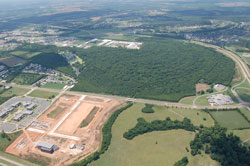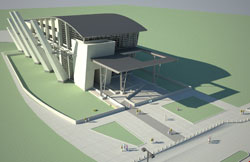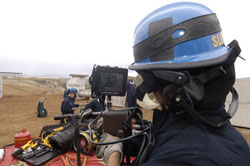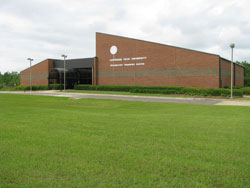Homeland security is clearly a growth industry. Going beyond protecting lives, assets and infrastructure, homeland security is proving to be a lucrative arena for small and large contractors alike, along with the communities and organizations that support them.

While the topic of homeland security has been embedded in public consciousness since 9/11, interest – and more importantly, funding to support it – spike every time there is an event, such as the botched terrorist attack attempted by a Nigerian man on Christmas Day, 2009.
Dr. Randy Null, director at the Institute for Micromanufacturing at Louisiana Tech, who previously held high profile positions in the Department of Homeland Security (DHS) and the Transportation Security Administration explained, “Every time something happens, like the Christmas Day event, it practically starts a whole new industry. The R&D that’s been going on quietly in labs, universities and at companies begins to surface, not only because people recognize a need, but because funding becomes available.”
He explained that the money that starts to flow after homeland security-related events typically comes from direct appropriations by Congress. In the case of the attempted Christmas Day bombing, this event quickly led to the adoption of full-body screening at airports, paid for largely by grants through the 22 homeland security agencies.
While the funding that supports homeland security may be cyclical, the drivers behind its growth aren’t. These forces include the increase in cyber terrorism and a concerted effort by local governments and higher education to encourage business development and R&D. Also fueling homeland security are savvy contractors who’ve developed timely products and services, along with the military’s 2005 BRAC (Base Realignment and Closure) decision that is turning the communities receiving the additional troops – and the resources that follow them – into homeland security hot spots.
Cyber Security: A Prominent Part of Homeland Security The increase of cyber attacks on government’s networks and critical infrastructure and the growing complexity of IT infrastructure, are driving the surge in federal cyber security spending. According to Market Research Media, a market research firm, the U.S. federal government’s total cumulative cyber security spending will be $55 billion between 2010 and 2015.
The increase of cyber attacks on government’s networks and critical infrastructure and the growing complexity of IT infrastructure, are driving the surge in federal cyber security spending. According to Market Research Media, a market research firm, the U.S. federal government’s total cumulative cyber security spending will be $55 billion between 2010 and 2015.
Nadia Short, director of strategic planning and business development information assurance division at General Dynamics concurs. “The release of the DHS budgets in February 2010 indicate a growth in cyber spending across all the services. With that, as well as continuing the natural evolution of what cyber will mean for dot-gov and dot-mil, it will mean nothing but opportunity for private industry.”
“The federal government relies heavily on complicated information systems for day-to-day operations. The risks posed to these systems have never been higher,” said Senator John McCain (R-Arizona). “Cybercrime and cyber espionage are on the rise. Indeed, nation-states seek to exploit our government networks, to steal sensitive intelligence or intellectual property for military and industrial advantage.”
Northern Louisiana is one region that is capitalizing on cyber security. Since 2007, the region invested more than $100 million to build the National Cyber Research Park and the Cyber Innovation Center, the first structure located on the 66-acre park in Bossier City.
 The Cyber Innovation Center (CIC) is a 135,000-square-foot, five-story building with 45,000 square feet of secure compartmentalized information facility, or SCIF, space, which is the highly secure space designed to meet the requirements of classified government agencies, the military and specialized government contractors. For the next two years, the 8th Air Force, which controls the nation’s B-52 and B-2 bomber fleets, will occupy 20,000 square feet of the SCIF space there while it builds a new facility to accommodate Barksdale Air Force Base’s expansion due to BRAC.
The Cyber Innovation Center (CIC) is a 135,000-square-foot, five-story building with 45,000 square feet of secure compartmentalized information facility, or SCIF, space, which is the highly secure space designed to meet the requirements of classified government agencies, the military and specialized government contractors. For the next two years, the 8th Air Force, which controls the nation’s B-52 and B-2 bomber fleets, will occupy 20,000 square feet of the SCIF space there while it builds a new facility to accommodate Barksdale Air Force Base’s expansion due to BRAC.
Another tenant who will occupy the CIC is Advanced Aerospace Reconnaissance, which specializes in the research and development of advanced airborne sensors and sensor systems. Scott Forrest, director of Louisiana Tech’s Technology Transfer Center, is one of three partners who started the company.
“We offer remote sensing for government and commercial clients alike,” said Forrest, a former Air Force pilot who holds a doctorate in nanotechnology engineering. “Being in the CIC positions us well for that, because of the defense contractors and government entities we hope will be looking for those kind of services.”
Craig Spohn, executive director and president of the CIC said, “We’re taking a long-term approach to look at state and local cyber network infrastructures, as well as the private network infrastructure to look at threat data that’s currently not being observed by federal agencies.”
He added that political alignment from state, local and federal government organizations made the CIC possible, creating infrastructure that wasn’t readily available before to support the knowledge-based workforce that the region is striving to develop.
Military and BRAC Decisions Fuel Homeland Security and Regional Growth With the BRAC realignment, some military installations are experiencing tremendous growth, which is fueling homeland security-related technology, research and jobs, along with an economic boom in those communities.
With the BRAC realignment, some military installations are experiencing tremendous growth, which is fueling homeland security-related technology, research and jobs, along with an economic boom in those communities.
In addition to Barksdale, Ft. Meade, strategically located in the Washington/Baltimore corridor in Maryland, and Ft. Bragg in Fayetteville, North Carolina, are two BRAC recipients.
Ft. Meade is gaining the Defense Information Systems Agency (DISA), one of the homeland security agencies, and is expected to gain the U.S. Cyber Command, which would unify and administer the Department of Defense’s vast computer networks to better defend against cyber attacks.
“This could be epicenter of cyber warfare to be fought in the future,” said Richard Story, CEO of the Howard County Economic Development Authority. Howard County is located next to Anne Arundel County, home of Ft. Meade.
He said that the BRAC growth is expected to generate 65,000 new jobs in the region over the next five years. National Security Agency contractor SAIC just moved into a 200,000-square-foot building in Howard County in December, 2009. Even before the BRAC growth, Ft. Meade generated $2.5 billion in economic activity in Howard County.
BRAC beneficiary Ft. Bragg is gaining 40,000 troops and commanders from the United States Army Forces Command (FORSCOM), currently located at Ft. McPherson in Georgia. By September 2011, only the Pentagon will have more high-ranking generals than Ft. Bragg.
According to Bo Gregory, economic development project manager at the Fayetteville-Cumberland County Chamber of Commerce, FORSCOM currently offers contracts in the billions of dollars. The defense contractors who fulfill them are expected to follow to remain close to the decision makers. It will also provide opportunities for local businesses and entrepreneurs to compete for those contracts.
“Since the announcement of BRAC 2005, our local economic development leaders have crafted a number of strategies to enhance recruitment of those firms,” said Gregory.
Incubators, Infrastructure and Tax Credits Lure Homeland Security-Related Business
Around the country, local governments and economic development groups are creating lucrative strategies to recruit business and development in the homeland security sector. They have started business accelerators and incubators, and literally laid the foundation with security-minded infrastructure and developed tax credits draw these businesses.
 While the Fayetteville-Cumberland County Chamber of Commerce is not alone in their efforts, they are highly proactive in capitalizing on the business that Ft. Bragg brings.
While the Fayetteville-Cumberland County Chamber of Commerce is not alone in their efforts, they are highly proactive in capitalizing on the business that Ft. Bragg brings.
The Partnership for Defense Innovation’s (PDI) Defense and Security Technology Accelerator (DSTA), located in Fayetteville, is a new program designed to create collaborations with the military, entrepreneurs and innovators that will drive technology business development, technology commercialization and job creation. The DSTA also includes fully furnished, Class A office space at below-market rent for participants.
“It’s designed to generate innovative security and defense technology solutions to meet both the military’s needs and business demands in a rapid eight to 18-month timeline,” said Scott Perry, president at the PDI.
Cumberland County is also home to the North Carolina Military Business Center (NCMBC), a program that began locally and now is now a state-wide program offering business development and business assistance.
“We’re constantly monitoring opportunities coming from homeland security related agencies, whether it’s from the Department of Defense (DOD), Transportation Security Administration (TSA) or the Coast Guard,” said NCMBC executive director Scott Dorney.
Plus, the Military Business Park is currently under construction next to Ft. Bragg in Fayetteville. The facility will offer office space that will be leased to defense contractors working with the military and is expected to be a high security park due to the homeland security applications likely to be developed there.
Howard County, Maryland, is another locale building more of the secure SCIF space to meet demand. It has partnered with specialty developers such as Wilhelm Commercial Builders in Annapolis Junction, Maryland, to build SCIF buildings in the area.
Further west, Mesa, Arizona, is also offering lucrative tax benefits to defense-related businesses. The Phoenix-Mesa Gateway Airport, site of a former air force base, offers qualifying companies tax credits through Foreign Trade Zone and Military Reuse Zone programs, which reduce or virtually eliminate property taxes.
Louisiana has also been proactive in developing this business sector. The state offers Angel Investor, Digital Media and Research & Development tax credits designed to promote advanced technology and security businesses.
Les Guice, vice president for research and development at Louisiana Tech, noted that the state’s universities work closely with Louisiana Economic Development and other state and regional entities to ensure that existing and prospective businesses are aware of these incentives.
“Plus, the National Cyber Research Park and Cyber Innovation Center is an outstanding example of a public-private partner that supports linkages between academic, industry and government partners in areas related to national cyber security,” Guice said.
This hasn’t gone unnoticed by large contractors such as Northrop Grumman, which has facilities in Louisiana.
Jerry Buckwalter, Northrop Grumman’s vice president of homeland security, said, “In some regions, we see a great deal of innovation. They’re bringing together grants from places like the Department of Homeland Security and packaging them into larger security solutions that allow a company like Northrop Grumman to bring our business there.”
Higher Education, R&D and Homeland Security are Intertwined The regions that are actively courting homeland security-related business all have strong ties to higher education, along with strong R&D activity.
The regions that are actively courting homeland security-related business all have strong ties to higher education, along with strong R&D activity.
Howard County, Maryland, is home to Johns Hopkins University Applied Physics Lab, with 4,500 employees doing research for the Navy and the Department of Defense, along with independent research.
In both Arizona and Louisiana, academia plays an important role in supporting the areas’ planning for homeland security and disaster mitigation. In Louisiana, the faculty at the state’s universities are among the first to be called to conduct analyses that can project the impact of hurricanes that may hit the coast. Meanwhile, the city of Mesa and Arizona State University have developed a strong relationship utilizing ASU’s Decision Theater for threat vulnerability assessments, engineering protective barriers, planning strategies, response and prevention activities, according to Bill Jabjiniak, the city’s economic development director.
Louisiana Tech also has a number of advanced technology research projects related to homeland security, including faculty in the Institute for Micromanufacturing who develop sensors and sensor networks for detecting chemical, biological and nuclear materials. Other faculty are working on cyber security and information assurance research relating to threats to cyber infrastructure.
Homeland Security Helps Cities Protect Their Own Interests
Some areas, like Mesa, have become especially proactive regarding their own security.
As David Ly, head of Iveda Solutions, a DHS-Qualified Anti-Terrorism Technology security contractor for Mesa said, “Critical infrastructure, power, electrical facilities, water treatment plants and city infrastructure are all at risk to domestic terrorism. We need to understand what the people on bicycles are doing in front of the water treatment facilities because one little pill could cause a city a lot of harm.”
Iveda provides video surveillance solutions for the city to monitor most of these critical systems.
“And for homeland security to be effective, it must be a system,” added Mesa’s Jabjiniak “The system here includes personnel, training, education, equipment, exercising and funding.”
Fittingly, Mesa was one of the early participants in the Arizona Counter Terrorism Information Center (ACTIC), a fusion center with a focus on terrorism awareness, prevention and response that shares information and best practices with local and nationwide authorities.
Business Opportunities Abound for Those Focusing on Homeland Security
Businesses and economic developers agree that homeland security is big business.
Fayetteville-Cumberland County Chamber of Commerce’s Bo Gregory said, “We’re actively looking to support this industry.”
Scott Dorney, at the North Carolina Military Business Center, said, “As we grow our defense sector, we increase our competitiveness to win homeland security-related contracts. It’s a growth industry.”
Jerry Buckwalter at Northrop Grumman concurred, “Homeland Security is a good market for us.”
And by making the United States a safer place, everyone wins.

